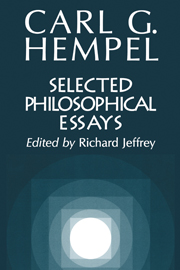Book contents
- Frontmatter
- Contents
- Preface
- Dates
- Introduction
- TRUTH
- Chapter 1 On the Logical Positivists' Theory of Truth
- Chapter 2 Some Remarks on “Facts” and Propositions
- Chapter 3 Some Remarks on Empiricism
- Chapter 4 The Problem of Truth
- Chapter 5 The Irrelevance of the Concept of Truth for the Critical Appraisal of Scientific Theories
- PROBABILITY
- METHODOLOGY
- MEMOIRS
- C. G. HEMPEL'S PUBLICATIONS
- Index
Chapter 3 - Some Remarks on Empiricism
Published online by Cambridge University Press: 05 June 2012
- Frontmatter
- Contents
- Preface
- Dates
- Introduction
- TRUTH
- Chapter 1 On the Logical Positivists' Theory of Truth
- Chapter 2 Some Remarks on “Facts” and Propositions
- Chapter 3 Some Remarks on Empiricism
- Chapter 4 The Problem of Truth
- Chapter 5 The Irrelevance of the Concept of Truth for the Critical Appraisal of Scientific Theories
- PROBABILITY
- METHODOLOGY
- MEMOIRS
- C. G. HEMPEL'S PUBLICATIONS
- Index
Summary
In this note, I want to deal with the objections which Dr. v. Juhos has raised in this periodical to certain considerations concerning the language of science, which are mainly due to Catnap, Neurath and Popper, and some which I have outlined in an earlier paper.
We may distinguish three main points to which v. Juhos's criticism refers: (I) The “behavioristic” interpretation of psychological statements such as “I see blue”: (II) the view that in our empirical science even statements of the kind just mentioned might be “altered” or “abandoned” under certain conditions; (III) the proposal to express “epistemological” considerations in the formal mode of speech.
Von Juhos maintains that each of these points is a thesis or a postulate of physicalism: He speaks of “the physicalist mode of speech which demands the alterability of all statements” (loc. cit., p. 89; in this passage, elements of each of the three independent points are combined), and he declares the recommendation of the formal mode to be “a special postulate of Physicalism” (loc. cit., p. 90). For the sake of clarity, it ought to be noticed that only (I) is a thesis of physicalism, whilst (II) and (III) are fully independent of it.
Indeed, physicalism asserts that the language of physics is a universal language of science – that is, “every sentence of any branch of scientific language is equipollent to some sentence of the physical language and can therefore be translated into the physical language without changing its content.”
- Type
- Chapter
- Information
- Selected Philosophical Essays , pp. 26 - 34Publisher: Cambridge University PressPrint publication year: 2000



